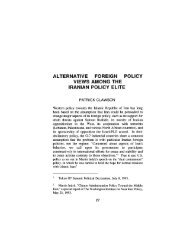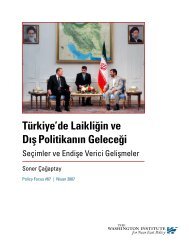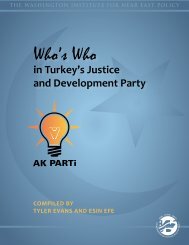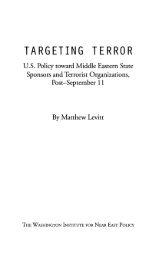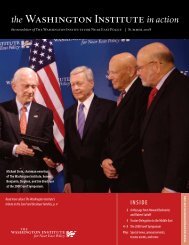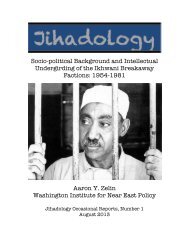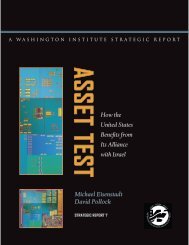The Palestinian Legislative Council - The Washington Institute for ...
The Palestinian Legislative Council - The Washington Institute for ...
The Palestinian Legislative Council - The Washington Institute for ...
Create successful ePaper yourself
Turn your PDF publications into a flip-book with our unique Google optimized e-Paper software.
Mohammad Mahmoud Abu Tir*<br />
Mohamed Mahmud Abu Tair, Muhammad Abou Tayr<br />
Member of Parliament – National List<br />
#2 on Change and Re<strong>for</strong>m<br />
Biographical In<strong>for</strong>mation<br />
• Born 1951<br />
• From Umm Tuba, Southeast of Jerusalem<br />
• Resides in Umm Tuba<br />
Personal History<br />
• Completed primary and preparatory education in Sour Bahr School<br />
• 1971 Completed High School Studies in al-Aqsa <strong>Legislative</strong> School<br />
• Completed military training in Beirut as a member of Fatah<br />
• Jailed <strong>for</strong> the first time in 1974 <strong>for</strong> eleven years. Released in Jibril deal of 1985, when<br />
1150 <strong>Palestinian</strong>s were freed in exchange <strong>for</strong> three Israeli soldiers held by the PFLP<br />
• 1987 Joined Hamas upon its creation<br />
• Was an Imam in Mosques in Umm Tuba and in Israeli prisons<br />
• 1998 Imprisoned in Israeli jail <strong>for</strong> arms possession and support to Hamas cells in the<br />
West Bank; freed in mid-2005<br />
• In late May 2006, was threatened with loss of residence permit in Jerusalem if he did not<br />
leave Hamas. Residency was stripped from him one month later, after the Shalit<br />
abduction.<br />
• Arrested by Israel following Shalit abduction<br />
Notable Quotations<br />
“Hamas has no problem with the Prisoners’ document's demand <strong>for</strong> a <strong>Palestinian</strong> state in all the<br />
territories occupied in 1967 but does not accept its recognition of international decisions that<br />
indirectly mean recognition of Israel."<br />
--Haaretz, June 8, 2006<br />
<strong>The</strong> following is from <strong>The</strong> Jerusalem Post:<br />
• "I'm from this house. I have been living here not <strong>for</strong> 20 years not <strong>for</strong> 50 years not <strong>for</strong> 100<br />
years. Um Tuba existed well be<strong>for</strong>e this. We have been here from the time of the Muslim<br />
arrival in the seventh century… Would you accept anyone taking you from your house<br />
and throwing you out of your house?"<br />
• “<strong>The</strong>re is a passage in the Koran about the tribe of Israel which says 'If I instruct you to<br />
kill them or to <strong>for</strong>ce them to leave their homes no one will do so except <strong>for</strong> a very few…<br />
Do you know what the meaning of this is? It means that throwing someone from their<br />
home is equivalent to killing them and only very few would do such a thing to someone<br />
else."<br />
• “It's like putting a cat in a corner. What will he do? Everything he can to get out... I'll go to<br />
an Israeli court because we are under occupation. We have no choice but to go to an<br />
Israeli court. <strong>The</strong> injustice being done to me because of this issue <strong>for</strong>ces me to go to an<br />
Israeli court."<br />
• "<strong>The</strong> prison administrators were fearful of him. If he told the prisoners to do something<br />
they would.” – a fellow prisoner on Abu Tir during his time in jail<br />
9




